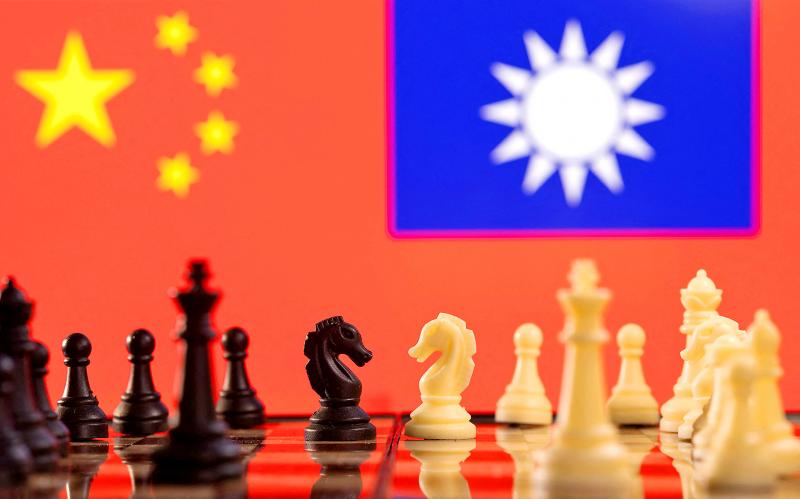The legislature hopes to pass amendments providing harsher punishment for economic espionage by the end of the month, sources said on Saturday.
Legislators aim to pass three readings of draft amendments to the National Security Act (國家安全法) and the Act Governing Relations Between the People of the Taiwan Area and the Mainland Area (臺灣地區與大陸地區人民關係條例) this month, sources said.
A proposed bill to amend the National Security Act, which passed a preliminary review on April 7, would prohibit people from helping China, Hong Kong, Macau, foreign countries or overseas hostile forces, or companies, organizations or people controlled by them, to infringe on the business secrets of the nation’s “core” technologies.

Photo: Reuters
Offenders under the law could face five to 12 years in prison or a fine of NT$5 million to NT$100 million (US$168,577 to US$3.37 million).
The amendment would also prohibit people from using and infringing on business secrets of the nation’s core technologies in China, Hong Kong, Macau and foreign countries, adding that offenders could face three to 10 years in prison or a fine of NT$5 million to NT$50 million.
To expedite prosecution, the amendment requires that the High Court hear the first instance of cases concerning national security, and the Intellectual Property and Commercial Court hear the first instance of economic espionage cases.
A draft amendment to the Act Governing Relations Between the People of the Taiwan Area and the Mainland Area, which passed a preliminary review on March 25, would forbid Chinese businesses or Chinese-funded entities based outside China from engaging in business activities in Taiwan without government approval.
Offenders would face up to three years in prison and fines of up to NT$15 million, while anyone who allows Chinese-funded businesses to use their name to operate in Taiwan would face fines from NT$120,000 to NT$2.5 million, the draft amendment says.
Under the bill, legal persons, groups and members of entities commissioned, subsidized or invested in to a certain extent by government agencies to engage in businesses involving the nation’s core technologies would need government approval to travel to China.
The requirement would remain for three years after the commission, subsidy or investment ends, or three years after the person has left their position, and offenders could face fines of NT$2 million to NT$10 million, it says.
During a negotiation at the legislature’s Internal Administration Committee on Thursday, New Power Party Legislator Chiu Hsien-chih (邱顯智) proposed a motion that the government regularly review and update the nation’s list of core technologies, which legislators and government officials at the meeting agreed to and added to the bills.
The drafts are to be negotiated in a cross-caucus meeting to be convened by Legislative Speaker You Si-kun (游錫堃), the sources said.
The legislative session is to end on May 31.

Taiwan has received more than US$70 million in royalties as of the end of last year from developing the F-16V jet as countries worldwide purchase or upgrade to this popular model, government and military officials said on Saturday. Taiwan funded the development of the F-16V jet and ended up the sole investor as other countries withdrew from the program. Now the F-16V is increasingly popular and countries must pay Taiwan a percentage in royalties when they purchase new F-16V aircraft or upgrade older F-16 models. The next five years are expected to be the peak for these royalties, with Taiwan potentially earning

POSITIVE DEVELOPMENT: Japan and the US are expected to hold in-depth discussions on Taiwan-related issues during the meeting next month, Japanese sources said The holding of a Japan-US leaders’ meeting ahead of US President Donald Trump’s visit to China is positive news for Taiwan, former Japan-Taiwan Exchange Association representative Hiroyasu Izumi said yesterday. After the Liberal Democratic Party’s landslide victory in Japan’s House of Representatives election, Japanese Prime Minister Sanae Takaichi is scheduled to visit the US next month, where she is to meet with Trump ahead of the US president’s planned visit to China from March 31 to April 2 for a meeting with Chinese President Xi Jinping (習近平). Japan and the US are expected to hold in-depth discussions on Taiwan-related issues during the

‘LIKE-MINDED PARTNER’: Tako van Popta said it would be inappropriate to delay signing the deal with Taiwan because of China, adding he would promote the issue Canadian senators have stressed Taiwan’s importance for international trade and expressed enthusiasm for ensuring the Taiwan-Canada trade cooperation framework agreement is implemented this year. Representative to Canada Harry Tseng (曾厚仁) in an interview with the Central News Agency (CNA) said he was increasingly uneasy about Ottawa’s delays in signing the agreement, especially as Ottawa has warmed toward Beijing. There are “no negotiations left. Not only [is it] initialed, we have three versions of the text ready: English, French and Mandarin,” Tseng said. “That tells you how close we are to the final signature.” Tseng said that he hoped Canadian Prime Minister Mark Carney

STAY IN YOUR LANE: As the US and Israel attack Iran, the ministry has warned China not to overstep by including Taiwanese citizens in its evacuation orders The Ministry of Foreign Affairs (MOFA) yesterday rebuked a statement by China’s embassy in Israel that it would evacuate Taiwanese holders of Chinese travel documents from Israel amid the latter’s escalating conflict with Iran. Tensions have risen across the Middle East in the wake of US and Israeli airstrikes on Iran beginning Saturday. China subsequently issued an evacuation notice for its citizens. In a news release, the Chinese embassy in Israel said holders of “Taiwan compatriot permits (台胞證)” issued to Taiwanese nationals by Chinese authorities for travel to China — could register for evacuation to Egypt. In Taipei, the ministry yesterday said Taiwan